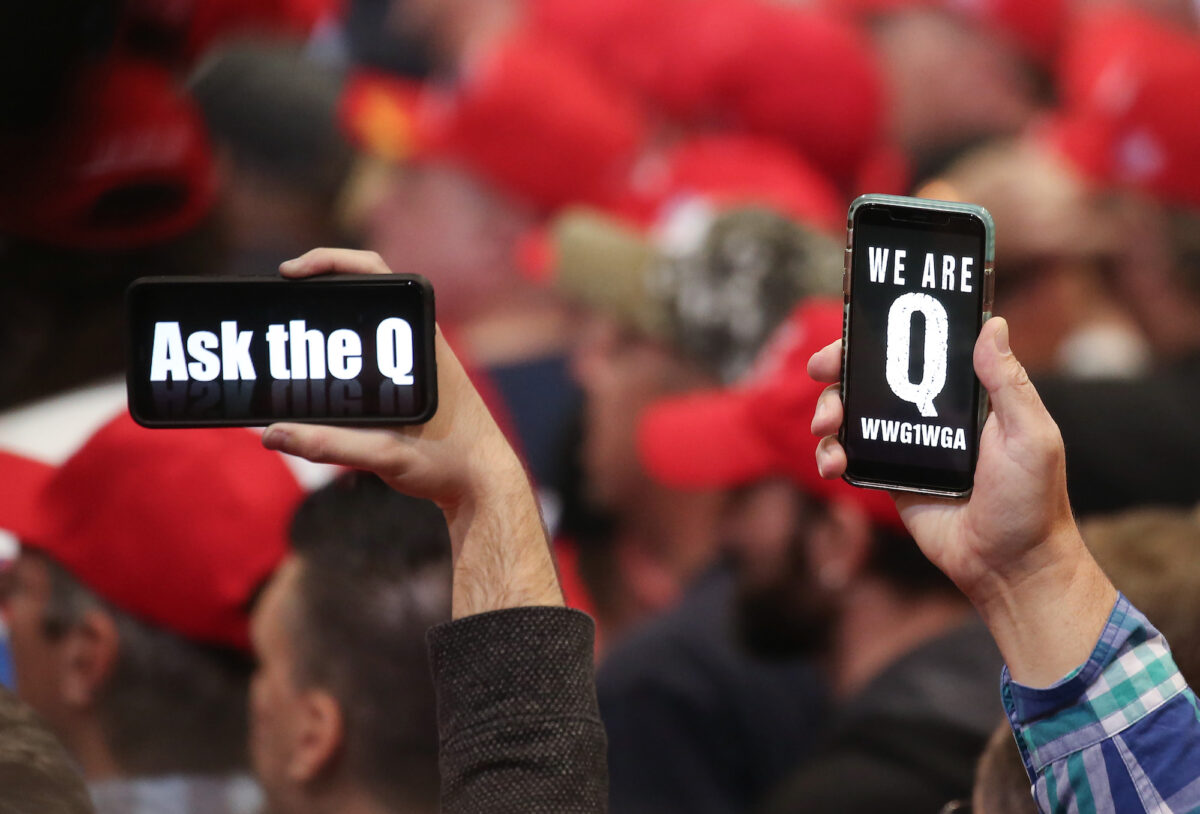
Commentary
Last week I took an unusual trip to the cinema because finally it was showing something worth seeing. It was “The Sound of Freedom,” directed by Alejandro Monteverde and starring Jim Caviezel.
The movie tells the real-life story of Tim Ballar, a special agent for Homeland Security and his work to rescue kids from a human trafficking cabal in Columbia. It was a thrilling movie that serves the hugely important public service of drawing attention to the size, scope, and evil of the child sex trafficking industry, a modern form of slavery. In any case, like most of the audience, I found the movie to be remarkably important.
That evening I looked up reviews and was startled to see all the usual suspects in the mainstream media trashing the film. It is not the contents or the message but rather that the main star Caviezel is supposedly connected with QAnon or holds views that are somehow QAnon.
I’ve been reading variously about this so-called QAnon for years now but it suddenly occurred to me that I had no idea what it is, what it means, where it comes from, and so on. Not once in my entire public career have I been contacted by anything called QAnon or seen anything written by or for such a thing. I’ve never heard of anyone close to me refer to it authoritatively or anyone who knows anything about it.
I naively thought that the New York Times would explain further. Maybe there is an email list, an organization, a manifesto, or something? So I began to follow the links they had in their article on the film. The next article had the same problem, just an assertion of this evil thing called QAnon but no evidence. So I would go to the next link and the next. Suddenly I realized that I was wasting my time. QAnon for the NYT is just a curse word, a thing they attach to something they are really against and really want their readers to be against too.
In the parlance of the NYT, there is a gradient of bad guys. To be a “conservative” is to be clueless, stupid, and easily led. To be “right-wing” is to be malicious, hateful, and probably very dangerous. But to be QAnon, that is beyond the pale, utterly hopeless and grotesque, deluded and insane and certainly a gravely destructive person who should never be allowed any platform much less professional success. The actor has expressed views consistent with QAnon, therefore he should not work again nor any film in which he appears be shown in public.
Still, the question remains: what is this QAnon? Does it even exist? So far as I can tell, the answer is no. My experience of never having encountered anything by that name is not unusual. None of the people who follow my account on Twitter can cite a single contact, association, or exposure at all. For all I can tell, QAnon is something made up by mucky mucks in the media to trash people they do not like. This is why they never give any precise explanation.
So now I was curious and began to look more deeply. I was right: there is no QAnon. This is a Q or some account called Q or perhaps many accounts by Q that lived on one of these weird forums on the internet where people with way too much time on their hands hang out. They are marginal dens of gossipers who troll, taunt, and yammer at all hours. Why anyone hangs out there is beyond me, and why anyone thinks it matters in the slightest also defies explanation. And how many people do? Are we talking hundreds or thousands or a few dozen? I have no idea.
Apparently, in 2017, this one account (or maybe many) began to pretend to be some Deep-State source who assured everyone that Trump has it all in control, that Ms. Clinton would soon be arrested and the child-trafficking cabal of which she is allegedly part would be broken up in good time.
Q’s counsel to everyone was essentially to do nothing because agents within the Deep State had it all under control. We might ask, who was really posting this stuff? Could be just some silly kid or it could be a clever troll looking for some digital attention. If you want to go full conspiracy, you could speculate that Q itself was a psy-op concocted by the CIA to pacify people who had grave doubts about the sincerity and magnanimity of the federal government.
I have no idea which is true but the real question is: why should it matter? Why should anyone even care about some dark silliness on 4chan, 8chan, 16chan, or any other of these troll farms?
Why would any respectable journalist be dragging up this gibberish and reporting on its ominous significance? The answer is rather obvious: in order to smear people. If you think about it, the delusional paranoia of the Times reporters absolutely needs a bête noir; otherwise, it would be difficult to justify their daily high dudgeon over the evil of anyone who disagrees with their line.
The tactic is extremely weird and ridiculously fallacious. The idea is that if you say anything that sounds a bit like what someone somewhere claims is a talking point of QAnon, which doesn’t really exist and therefore anyone can attribute anything to it, you thereby live under a cloud of discredit and disgrace.
For example, the film in question here alleges that child sex trafficking is a big and evil business. Establishment reviewers say that this is a QAnon talking point, and how do we know that? Because the main actor in the film is known to have had an association with QAnon even though no one has even been able to document either the association or thing with which he is associated. The only evidence is that he is concerned about child sex trafficking and so too is QAnon as proven by the actor’s focus on this issue.
In this way, you can construct circles of conflation of various associations with no independent evidence at all!
If this entire rhetorical racket strikes you as disreputable in the extreme, you are right. None of it makes any sense. But that doesn’t mean that it does not serve a purpose. The purpose is to smear, cancel, and shut down and do so for reasons of controlling political culture through the domination of the public conversation. The Times deploys this tactic if only to signal to its loyal reader base the issues about which they should speak and not speak.
It allows the reader base to dismiss “The Sound of Freedom” at the cocktail party. “I’m not going to see that QAnon trash,” they can say and thereby be done with it.
Something very similar happens with other rhetorical ploys such as the term “conspiracy theory.” This one is particularly poignant because I can think of no wackier conspiracy theory than the view that a successful actor and director of a major film are spending their time on dark corners of the web and being secretly controlled by anonymous postings of crazy people from six years ago.
You talk about conspiracy theory! That’s the most implausible one I can imagine! And I promise you this. If any reporter from the NYT decides to write about this column, the reporter will inform his readers that the author of this article has known associations with QAnon. The proof: I rather like this movie.
Views expressed in this article are the opinions of the author and do not necessarily reflect the views of The Epoch Times.

















































